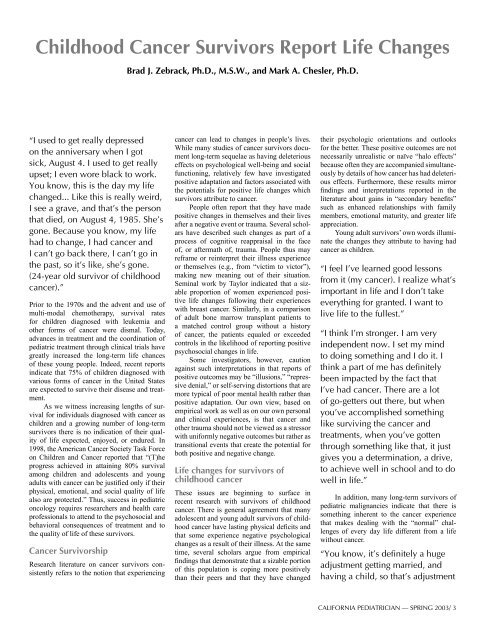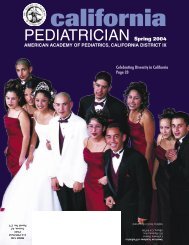PEDIATRICIAN Spring 2003 - AAP-CA
PEDIATRICIAN Spring 2003 - AAP-CA
PEDIATRICIAN Spring 2003 - AAP-CA
You also want an ePaper? Increase the reach of your titles
YUMPU automatically turns print PDFs into web optimized ePapers that Google loves.
Childhood Cancer Survivors Report Life Changes<br />
Brad J. Zebrack, Ph.D., M.S.W., and Mark A. Chesler, Ph.D.<br />
“I used to get really depressed<br />
on the anniversary when I got<br />
sick, August 4. I used to get really<br />
upset; I even wore black to work.<br />
You know, this is the day my life<br />
changed... Like this is really weird,<br />
I see a grave, and that’s the person<br />
that died, on August 4, 1985. She’s<br />
gone. Because you know, my life<br />
had to change, I had cancer and<br />
I can’t go back there, I can’t go in<br />
the past, so it’s like, she’s gone.<br />
(24-year old survivor of childhood<br />
cancer).”<br />
Prior to the 1970s and the advent and use of<br />
multi-modal chemotherapy, survival rates<br />
for children diagnosed with leukemia and<br />
other forms of cancer were dismal. Today,<br />
advances in treatment and the coordination of<br />
pediatric treatment through clinical trials have<br />
greatly increased the long-term life chances<br />
of these young people. Indeed, recent reports<br />
indicate that 75% of children diagnosed with<br />
various forms of cancer in the United States<br />
are expected to survive their disease and treatment.<br />
As we witness increasing lengths of survival<br />
for individuals diagnosed with cancer as<br />
children and a growing number of long-term<br />
survivors there is no indication of their quality<br />
of life expected, enjoyed, or endured. In<br />
1998, the American Cancer Society Task Force<br />
on Children and Cancer reported that “(T)he<br />
progress achieved in attaining 80% survival<br />
among children and adolescents and young<br />
adults with cancer can be justified only if their<br />
physical, emotional, and social quality of life<br />
also are protected.” Thus, success in pediatric<br />
oncology requires researchers and health care<br />
professionals to attend to the psychosocial and<br />
behavioral consequences of treatment and to<br />
the quality of life of these survivors.<br />
Cancer Survivorship<br />
Research literature on cancer survivors consistently<br />
refers to the notion that experiencing<br />
cancer can lead to changes in people’s lives.<br />
While many studies of cancer survivors document<br />
long-term sequelae as having deleterious<br />
effects on psychological well-being and social<br />
functioning, relatively few have investigated<br />
positive adaptation and factors associated with<br />
the potentials for positive life changes which<br />
survivors attribute to cancer.<br />
People often report that they have made<br />
positive changes in themselves and their lives<br />
after a negative event or trauma. Several scholars<br />
have described such changes as part of a<br />
process of cognitive reappraisal in the face<br />
of, or aftermath of, trauma. People thus may<br />
reframe or reinterpret their illness experience<br />
or themselves (e.g., from “victim to victor”),<br />
making new meaning out of their situation.<br />
Seminal work by Taylor indicated that a sizable<br />
proportion of women experienced positive<br />
life changes following their experiences<br />
with breast cancer. Similarly, in a comparison<br />
of adult bone marrow transplant patients to<br />
a matched control group without a history<br />
of cancer, the patients equaled or exceeded<br />
controls in the likelihood of reporting positive<br />
psychosocial changes in life.<br />
Some investigators, however, caution<br />
against such interpretations in that reports of<br />
positive outcomes may be “illusions,” “repressive<br />
denial,” or self-serving distortions that are<br />
more typical of poor mental health rather than<br />
positive adaptation. Our own view, based on<br />
empirical work as well as on our own personal<br />
and clinical experiences, is that cancer and<br />
other trauma should not be viewed as a stressor<br />
with uniformly negative outcomes but rather as<br />
transitional events that create the potential for<br />
both positive and negative change.<br />
Life changes for survivors of<br />
childhood cancer<br />
These issues are beginning to surface in<br />
recent research with survivors of childhood<br />
cancer. There is general agreement that many<br />
adolescent and young adult survivors of childhood<br />
cancer have lasting physical deficits and<br />
that some experience negative psychological<br />
changes as a result of their illness. At the same<br />
time, several scholars argue from empirical<br />
findings that demonstrate that a sizable portion<br />
of this population is coping more positively<br />
than their peers and that they have changed<br />
their psychologic orientations and outlooks<br />
for the better. These positive outcomes are not<br />
necessarily unrealistic or naïve “halo effects”<br />
because often they are accompanied simultaneously<br />
by details of how cancer has had deleterious<br />
effects. Furthermore, these results mirror<br />
findings and interpretations reported in the<br />
literature about gains in “secondary benefits”<br />
such as enhanced relationships with family<br />
members, emotional maturity, and greater life<br />
appreciation.<br />
Young adult survivors’ own words illuminate<br />
the changes they attribute to having had<br />
cancer as children.<br />
“I feel I’ve learned good lessons<br />
from it (my cancer). I realize what’s<br />
important in life and I don’t take<br />
everything for granted. I want to<br />
live life to the fullest.”<br />
“I think I’m stronger. I am very<br />
independent now. I set my mind<br />
to doing something and I do it. I<br />
think a part of me has definitely<br />
been impacted by the fact that<br />
I’ve had cancer. There are a lot<br />
of go-getters out there, but when<br />
you’ve accomplished something<br />
like surviving the cancer and<br />
treatments, when you’ve gotten<br />
through something like that, it just<br />
gives you a determination, a drive,<br />
to achieve well in school and to do<br />
well in life.”<br />
In addition, many long-term survivors of<br />
pediatric malignancies indicate that there is<br />
something inherent to the cancer experience<br />
that makes dealing with the “normal” challenges<br />
of every day life different from a life<br />
without cancer.<br />
“You know, it’s definitely a huge<br />
adjustment getting married, and<br />
having a child, so that’s adjustment<br />
<strong>CA</strong>LIFORNIA <strong>PEDIATRICIAN</strong> — SPRING <strong>2003</strong>/ 3








